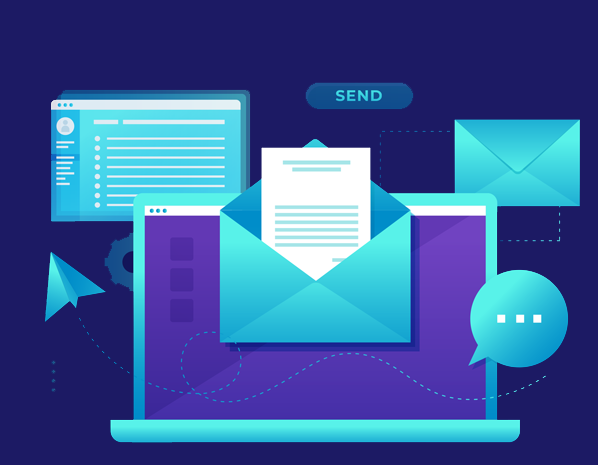Marketing Success Depends on the Selection of a Responsive Business Email List
We Can Help You Find the Perfect Business Email List

EMAIL – IMMEDIATE, TRACKABLE, EFFECTIVE
Prospecting from a business email list that’s been verified and enhanced for the most complete, accurate customer records is more than just a chance to establish contact. You know your new audience to an unprecedented degree even before you’ve introduced yourself, and knowing these details lets you align your message and their interests more closely than ever.
Business Email Lists – Instant Access to over 35 Million Engaged Business Professionals
If you are communicating with your customers via email, you already know that email marketing is one of the best ways to reach your target audience, and it has the potential to generate the largest return on your marketing investment. And, email is the third most influential source of information for B2B audiences, just behind colleague recommendations and industry thought leaders, according to Content Marketing.
To gain more sales, you want to increase your customer base. That’s where renting email lists comes in —and this can generate solid results for your business. When you rent a business email list, you pay a third party to use their customer list for a one-time email blast, unless you pre-negotiate for additional email transmissions. With a rented business email list, the owner of the list agrees to send your email message to their customer list on your behalf. You supply the copy, design and subject line, and they do the rest. You will not be able to view contact names, email addresses or other contact information, but you will be able to review a datacard, which provides important audience targeting information about the list. Once you agree on the list you want to rent and provide your creative, the owner will transmit your email campaign.
Steps to rent a business email list and transmit an email:
- You write the copy and create the html design for the email.
- You choose the number of recipients you want to receive your email.
- You provide a sample of your message to the list owner for approval, and sign a list rental agreement. List owners will generally not approve competitive offers to their customers.
- You provide the list owner the date and time you want to transmit the email.
- You provide your suppression file that contains email addresses that you do not want to email to as well as your unsubscribes to the list owner.
- Then comes testing. You are sent a test of the email through the transmission system for final approval.
- Once approved, the owner sends your email on the agreed upon date and time using their server address.
- A few days after the campaign is transmitted, you will be provided with tracking results that will give you information such as open rates and click through rates
Where Can I Rent a Business Email List?
The most common ways to rent an email list include:
1.Directly from the list owner
The list owner will handle your campaign transmission.
2. Email List brokers
Hire an experienced audience development (AD) specialist with established industry contacts. A list broker will help you choose the lists that will work for your offer from all the lists available on the market and will negotiate the best pricing for you. Once you choose your list, the AD specialist will then make sure your email campaign is tested and transmitted and will provide you with tracking results. The broker receives a commission from the list owner so you are not charged for his/her services.
3. Email marketing companies that offer list rental solutions
You will work with a list manager, who acts as a broker for the list owner and who often will handle the transmission for the email campaigns. List managers receive commission from the list owner so you are not charged for his/her services.
What is a Datacard?
A datacard gives information on the email list you are interested in renting, such as number of email addresses available, costs based on price per thousand, and a description of the list. Make sure the datacard includes an update frequency to ensure a clean, up-to-date list. Click here to view datacards of email lists that Reach Marketing offers.
With larger email lists you can further segment your audience by choosing from selects such as job title, company size, sales volume or geographic region to narrow your list to the exact audience you want to reach so you can achieve higher results.
When choosing a business email list, ask for usage information available, which shows what other brands have used the email list and what its success has been in terms of results.
A business email list generally costs in the range of $300-$400 per 1,000 names, with a rental minimum of 5,000 names.
Email Deliverability
Before your campaign transmits, the list owner will test your creative against a spam filter to assure better deliverability and also in a rendering program to make sure your creative renders properly in major email clients, such as Outlook and Office 365, and on mobile, including Androids and iPhones. When using a rented email list, you need to ask the list owner to run your suppression file against their list. A suppression file will remove your unsubscribes from the email campaign and will also remove any email addresses you want omitted – like your customers who may also be on the rented list – from the transmission.
With a rented email list, you must include an “opt out” from your company in addition to the “opt out” that the list owner must provide. The creative that you provide to the list owner for the mailing also must include your physical address to comply with CAN-SPAM requirements.
Reach Marketing Offers Quality Business Email Lists
Reach Marketing is a reputable email marketing agency offering email list rental solutions. You can rely on our expertise to ensure that your campaign runs smoothly. We provide quality business email lists through our list owner partnerships that you can rent, and our experienced list managers will help you reach your ideal audience by identifying key firmographic and demographic segments that align your offer with the most promising leads.
ReachBase
With more than 35 million unique, accurate email records, ReachBase is a responsive B2B prospecting database. This multi-sourced, multi-channel database spans a vast array of influential professionals and decision-makers, including C-level executives, technology thought leaders, financial advisors, architects, engineering contractors, healthcare professionals, marketing managers, supervisors and more across all industries. With detailed firmographic data on individuals and extensive company profiles, the database encompasses everything from single-owner businesses to large corporations.
For more information about our business email list services, Contact Reach Marketing at 855-867-3224.
Business Email List Selectivity
Selects allow you to pinpoint your audience even further. Additional fees are charged for selections ranging from $5 to $50+.
Popular selects for business email lists include:
- Industry/Business Type
- SIC Code
- Job Title
- Job Function
- Number of Employees
- Sales Volume
- One Per Company
- Products Purchased
- Gender
- Geography
About Reach Marketing
Reach Marketing is an integrated marketing solutions company that helps marketers reach their target audiences and grow their businesses through traditional and digital marketing channels. Services include list brokerage, list management, business intelligence, email append, database management, email marketing, SEO and social media, business email list and marketing automation.
Reach your target audience
through quality business mailing lists and email lists.
Contact Reach Marketing
NEW YORK | MIAMI | PHOENIX | LOS ANGELES
Speak with our email list expert today!
Business Email Lists
Marketing Success Depends on the Selection of a Responsive Business Email List We Can Help You Find the [...]
Renting a Business Email List: What You Need to Know
You’re launching a new product and you need to get the word out to buyers who would be very interested in hearing more about it. Or you’re hosting an online seminar and need to reach [...]
Electronics Manufacturing Mailing Lists and Email Lists
ELECTRONICS PROFESSIONALS MULTI-CHANNEL MAILING LISTS Give Your Next Campaign a Boost By renting electronics professionals mailing lists and email lists, you can reach the professionals responsible for all of their company's [...]

